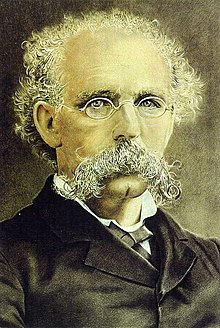Terence V. Powderly
Terence Vincent Powderly (22 January 1849–24 June 1924) was an Irish-American politician and labor union leader. He was the first three-term mayor of Scranton, Pennsylvania. He had several top government jobs. He is best known as the leader of the Knights of Labor in the late 1880s.
Terence Vincent Powderly | |
|---|---|
 | |
| 5th Mayor of Scranton | |
| In office 1878–1884 | |
| Preceded by | Robert H. McKune |
| Succeeded by | Francis A. Beamish |
| Personal details | |
| Born | January 22, 1849 Carbondale Pennsylvania, U.S. |
| Died | June 24, 1924 (aged 75) Petworth, Washington, D.C., U.S. |
| Political party | Greenback-Labor Party |
| Residence | Scranton, Pennsylvania |
| Occupation | Leader of the Knights of Labor (1879–1893) |
Career
changeTerence V. Powderly was born in Carbondale, Pennsylvania on 22 January 1849.[1] His parents, Terence Powderly and Madge Walsh, were Irish immigrants.[1] As a young man he worked for the railroad as a switchman. In 1871, he became a member of the International Machinists and Blacksmiths union. He later became its president. During the Long Depression (1873–1879), he didn't have a job. He was blacklisted for being a 'union agitator'.
In Scranton in 1876, Powderly joined the local branch of the Knights of Labor. He quickly moved up in the union. By 1879, he became the leader (his title was Grand Master Workman).[1] While he was the leader, the Knights of Labor had the most members and most influence it ever had. After 1886, the Knights declined. In a struggle for power, Powderly was removed. His rival John William Hayes became the leader. Having lost his position, Powderly studied to become a lawyer. In 1894 he was admitted to the Bar (became a lawyer) in Pennsylvania. For this he was thrown out of the Knights of Labor.[a]
While he was the Grand Master Workman, he was also the mayor of Scranton (1878–1884).[1] In the 1896 presidential campaign, he supported Republican William McKinley. As a reward, President McKinley appointed Powderly United States Commissioner General of Immigration in 1897.[3] He was dismissed as Commissioner General in 1902 by President Theodore Roosevelt.[3] Powderly's work for immigration reform led to his dismissal. But in 1906 an investigation cleared him of any wrongdoing.[1] He was given the position of Special Immigration Inspector. He then became Chief of the Division of Information in the US Department of Immigration[b] from 1907 to 1921.[4] Next he became Commissioner of Conciliation for the United States Department of Labor (1921–1924).
Legacy
changePowderly died in Washington, DC on 24 June 1924.[3] Many early labor historians have been very critical of Powderly and the Knights of Labor. However, very few did more for the early labor movement.[5] The actions and accomplishments of Terence V. Powderly have been reevaluated in the last twenty years.[5] While he still has not had a "competent biographer", it is clear he and his Knights are becoming much more admired and respected.[5] In 1999, Powderly was inducted into the Hall of Honor at the US Department of Labor.[6]
Related pages
changeNotes
change- ↑ In the bylaws, the Knights of Labor did not allow lawyers, bankers, and stockbrokers as members. Saloon keepers and gamblers were also excluded.[2]
- ↑ Now the U.S. Immigration and Customs Enforcement, of the United States Department of Homeland Security.
References
change- ↑ 1.0 1.1 1.2 1.3 1.4 Timothy J. Meagher, The Columbia Guide to Irish American History (New York: Columbia University Press, 2005), p. 297
- ↑ David Thomas Brundage, The Making of Western Labor Radicalism: Denver's Organized Workers, 1878-1905 (Urbana: University of Illinois Press, 1994), p. 64
- ↑ 3.0 3.1 3.2 Ireland and the Americas: Culture, Politics, and History, Vol, 2 eds. James Patrick Byrne; Philip Coleman; Jason Francis King (Santa Barbara, CA: ABC-CLIO, 2008), p. 766
- ↑ Timothy J. Meagher, The Columbia Guide to Irish American History (New York: Columbia University Press, 2005), p. 298
- ↑ 5.0 5.1 5.2 Labor Leaders in America, eds. Melvyn Dubofsky; Warren R. Van Tine (Urbana: University of Illinois Press, 1987), pp. 59, 61
- ↑ William Holley, Kenneth Jennings, Roger Wolters, The Labor Relations Process (Mason, OH: South-Western Cengage Learning, 2009), p. 69
Other websites
change- 1999 Hall of Honor Inductee Archived 2013-12-25 at the Wayback Machine